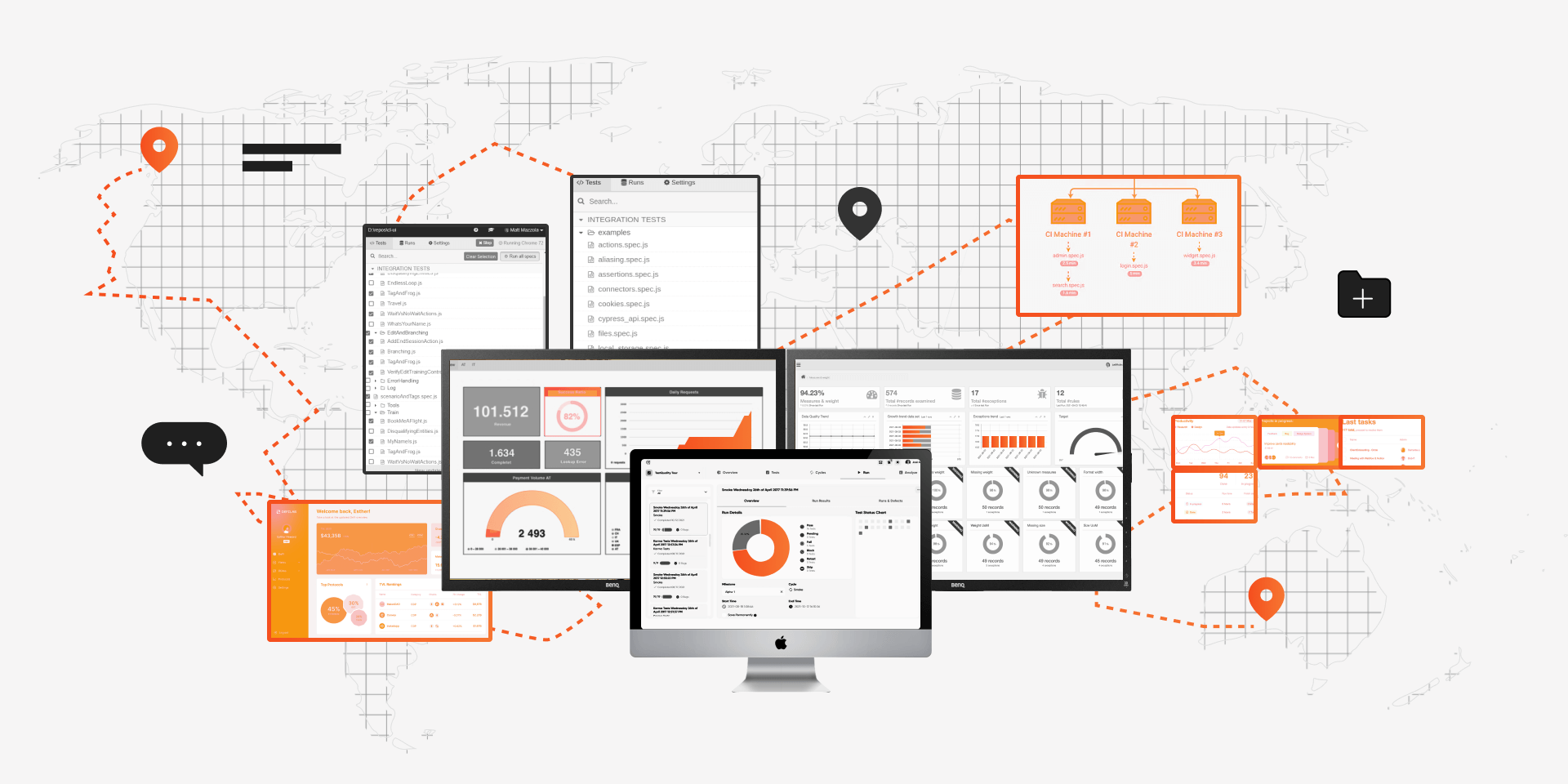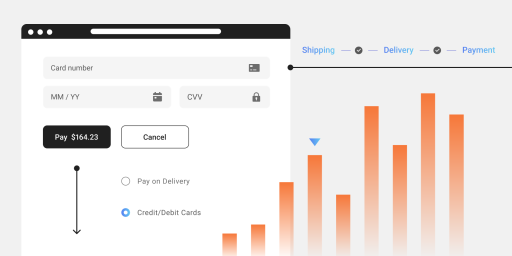The quality of software is what drives people to use it and become invested in it. This explains why in recent years, software testing has become just as important as development, design, and technical support. With the increased strategic importance of testing, the cost for high-level software testing services also went up. This motivates business owners to look for cost-saving techniques that won’t affect the software’s performance or the quality of distributed services. Quality assurance outsourcing is one such technique.
According to Statista, the global market value of outsourcing reached $92,5 billion in 2019. The percentage of companies that outsource testing varies from one industry to another, yet the tendency of it growing yearly remains the same. For example, 68% of the US-based businesses focusing on consumer goods outsource some part of their manufacturing on a regular basis. The IT industry accounts for 60% of all outsourced jobs globally, closely followed by accounting services. The big share of high-tech outsourcing belongs to offshore software testing services. In today’s QA outsourcing guide, we are exploring why so many companies swear by this particular type of IT outsourcing and how to make the most of your cooperation with software testing service providers.
The Basic Benefits of QA Outsourcing Strategy
You save money when you outsource software testing
Even though quality should always come first for software owners, we all understand that project resources are finite. Therefore, they need to be wisely prioritized. This is exactly what outsourced offshore testing is here for ― cutting costs and offering reasonable savings. With outsourcing, you can work with the best companies with deep expertise in testing and reduce your expenses without sacrificing the quality of testing.
To put it clearly, let’s compare the average incomes of software testing engineers across different regions. According to Zippia, the average 12-month salary of a quality assurance engineer in the United States is $72,000, although depending on the state/city and years of experience it ranges from $59,000 to $87,000. In other countries, this range is as follows:
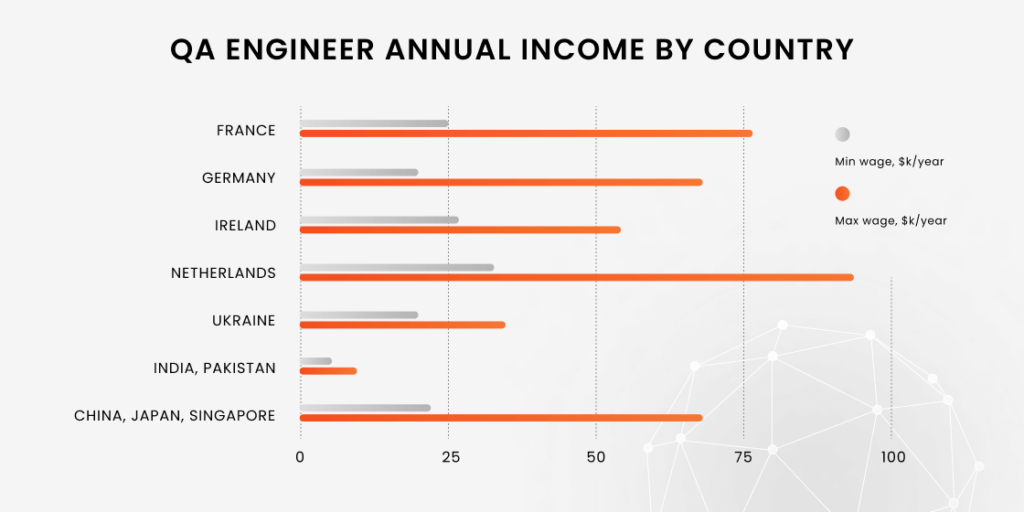
If we narrow these numbers down to an approximate hourly rate for each region, we’d receive the following:
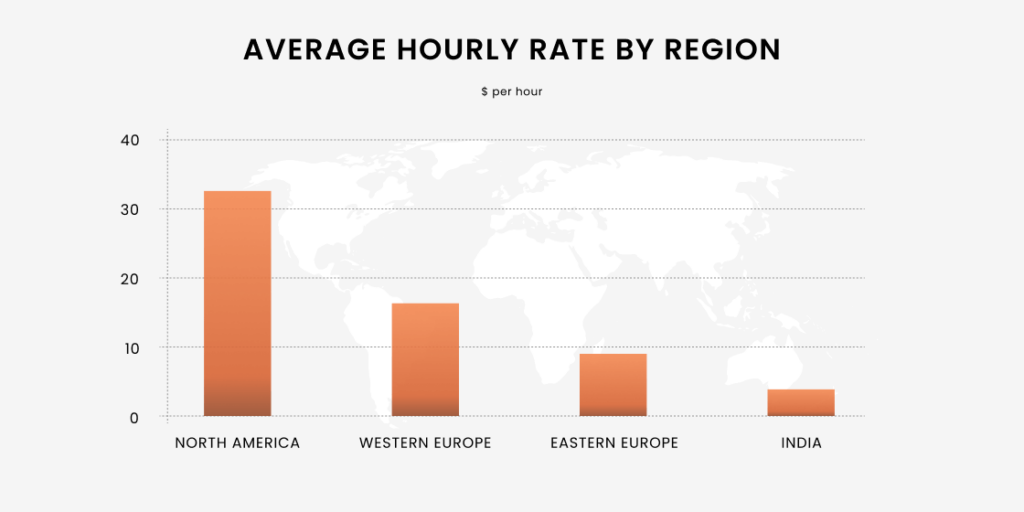
As you can see, people occupying the same positions and possessing the same level of expertise can make drastically different incomes. This is explained by the state of economy of each particular country, currency rate comparison, and other macro- and microeconomic factors. Software testing outsourcing allows businesses to take advantage of them without compromising any legal or ethical aspects of the offshore partnership.
While lower hourly wages of offshore software testing engineers bring instant benefits to project owners, the long-term financial advantages of QA outsourcing are just as valuable for the business. The benefits of outsourced testing include maximum resource availability and the ability to hire more qualified human resources specializing in all kinds of testing services within the same budget frames. The global talent pool of quality assurance engineers accounts for millions, and by choosing the outsourced offshore QA strategy, you expand your list of candidates by that number. Same thing with years of experience and level of expertise. Having so many affordable options to choose from, you can set higher requirements for candidates (for example, recruit middle-level engineers instead of junior ones), and it will still fit your budget frames perfectly.
Testing outsourcing fits even the shortest-term projects
Long-standing projects have many options for software testing strategy. To name a few, that could be a permanent in-house team, a long-term contract with an external QA team, or many small testing tasks delegated to an offshore software testing vendor by an in-house manager. But what about startups, one-person enterprises, and small companies that simply do not need a full-cycle QA team working for them five days a week?

“Many people in need of quality assurance services mistakenly think that their projects are not large-scale enough to contract with third-party technology vendors. In reality, we can easily organize the software testing process for as few as 20 working hours planned. If an outsourcing agency is client-oriented and has established its internal workflows well, no project will be considered as “not worth taking”.
Slava Fioletov, Vice President, CIO for TestFort, Inc.
Even though the US and European employment regulations do not have a requirement for minimal contract duration, it’s clear that you’re unlikely to find a tester who would accept a week-long job. However, outsourcing QA companies would be glad to do so! One of the benefits of outsourcing software testing is that it’s a very flexible option in terms of project duration. You can easily hire an offshore software tester (or a whole team) to test a sole function in your application and get the results in days. Of course, even the shortest outsourced software testing projects still require planning, legal arrangements, and environment setup, but the smaller the work scope is, the sooner you’ll get the testing reports.
Quality assurance outsourcing frees up time in your day
Beyond question, programming and testing are an integral part of the software industry, but there is a lot more to a successful application than just a clean codebase. Non-technical project needs like business analysis, market fit, advertising and marketing campaigns, fundraising are just as important. And what makes them even more special, such duties are nearly impossible to delegate to external providers, unlike a more autonomous part of the software development process such as testing.
In large organizations, it’s usually enough resources to evenly distribute both technical and non-technical workload evenly across various departments. But when you’re trying to launch a digital product with a couple of other enthusiasts or even completely on your own, things might become overwhelming pretty quickly. Before this happens, it’s best to find someone to delegate part of your duties to.
You don’t want to underestimate the first impression your app is going to make after hitting the digital market. Marketing strategy, advertising channels, content plan, and other sales-driving aspects should be planned ahead of time and executed seamlessly. A product owner is the best person to communicate the value of their application to the audience, after all, it’s you who first saw the need for that particular product on the market. That’s why the idea of outsourced and offshore testing and/or development by a reliable service provider making yourself free for strategic company growth is worth trying. Independent software production is always all hands on deck, so do not underestimate the power of wise delegation.
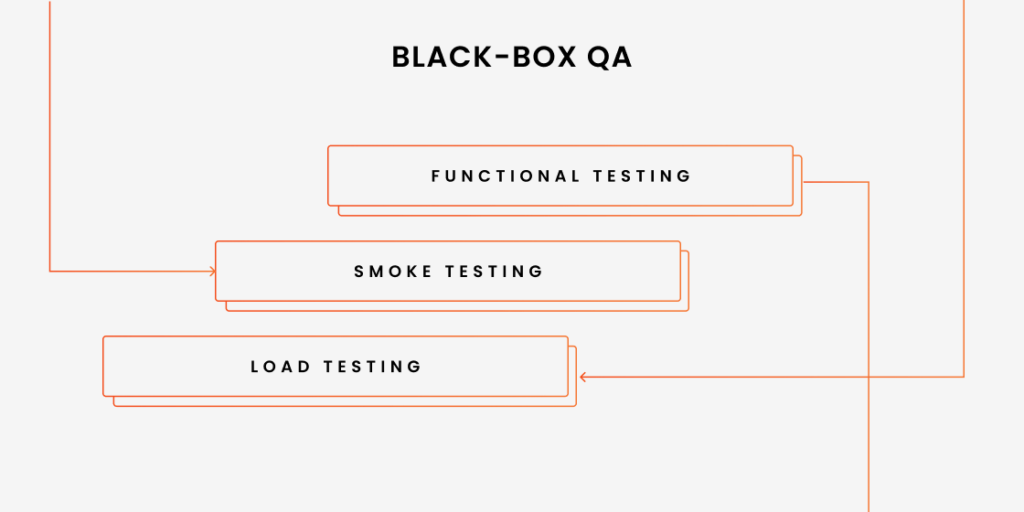
Offshore QA helps to avoid cognitive bias
We look for mistakes in the work of others way more willingly than in our own. This is explained by a phenomenon called cognitive bias ― a systematic error people make when interpreting information that affects their conclusions and decisions. Cognitive bias can occur due to many things, from culture code to personal memories and professional habits. And testing is one of the aspects of product development that are more prone to bias.
Testing a software product, the team involved in early brainstorming, digital conceptualization, and market fitting will unintentionally praise the application they contributed to. And this has nothing to do with the professionalism or experience of a particular tester or a QA team. A biased look at the results of our own work is typical for all humankind. People working for a product company on a full-time basis can’t help but feel motivated to push the product to the market, which frequently prevents them from spotting errors, especially high-level ones. To solve this issue, companies have two ways to go: either outsource quality assurance processes at once or keep testing in-house while the product is under development and then get it thoroughly tested just before the release.
The second option describes the process of black-box testing outsourcing. This is a quality assurance approach implying software check from an end-user perspective without the information on its codebase, or even without any programming skills at all if performed by a focus group. This procedure gives priceless insights into user experience and the impression your product makes on people. Namely, the back-box approach is applied to the following testing types:
- Functional testing that explores what application actually does, what are the core features, and how well they work;
- Usability testing, also known as UI/UX testing, examines the product’s design and user-friendliness;
- Smoke testing checks if each separate code build is stable enough to perform its functions, therefore collectively all the build will make a decent product ready for final testing;
- Load testing is aimed at observing the application’s reaction to different levels of load, from very low to extremely high.
The decision to outsource software testing to a third-party vendor is a perfect way to avoid cognitive or any other bias towards your application, as outside software testers must approach the project with an open mind. The thing is, outsourcing testing teams prioritize the testing results over anything else, including all the time spent on development and the desired release date. Outsourcing the testing to QA experts who know the bare minimum about your product before they get to test it assures the most transparent and trustworthy feedback.
Benefits of Client-Vendor Relationships in Offshore Quality Assurance
Easy and fast arrangement
Imagine a US-based owner of a small-sized enterprise decides to invest in a software application to represent their company online. The budget for that project is going to be formed depending on the app’s functionality, technology stack, development time frames, marketing strategy, and the number of people to cover the scope. Clearly, the business owner counts on getting his investments back and sees the future application as a business growth accelerator for the company. But this is only possible if the app turns out to be high-quality, easy to use, and functioning. All these metrics are the Quality Assurance team’s responsibility, so the business owner starts looking for a reliable testing firm.
Quote with sales about the average length between first contact and first test that we run on a client project.

“The amount of time that takes an offshore software testing company to respond to a client’s request allows you to evaluate the potential effectiveness of this cooperation. After 22 years in the QA service market, our polished internal operations made us able to minimize the period between the first-time meeting with a new client and first test case execution leaving them with more precious time before the launch.”
Maxim Levitskiy, Head of Acount Management
In case the company does not work in the technology sector, chances are the idea of hiring a full-time QA department simply won’t fit: when the app hits the market, technical support for it won’t require as many people as during the development phase. Even if a company owner takes the idea of forming a full-time testing squad for a few months into consideration, there are still a lot of pitfalls. Workspace, costly equipment, legal arrangements, taxes, recruiting, onboarding, social benefits for employees ― all this becomes the top manager’s headache. As opposed to offshore software testing services, where literally everything related to the process from electricity bills to HR management is included in the price. To offshore software QA, all you have to do is provide the information about your product, negotiate the testing strategy, sign the necessary documentation (which is standardized at large vendors), and ― bam! ― your first bug report is already there, waiting to be reviewed.
Access to industry-specific background
Just a few years ago, software testing was considered nothing else than a set of actions aimed at spotting code bugs. As the quality standards for programming products grew, so did the strategic importance of software quality assurance. Over time, testing penetrated literally every single stage of a software development life cycle: it now starts with prototype and concept testing and gets followed by UI/UX analysis, MVP testing, pre-release QA, installation testing, and ongoing technical support after the launch.
High-level quality assurance aiming at discovering business-threatening issues before they make it to the end product requires industry-specific expertise and niche background in teams. The thing is, different industries have completely different requirements for the software systems, which are mostly connected to functionality expected from a program, target audience, the use of specific testing tools, and even laws and regulations in some cases.
As an example, let’s look at two CRM systems, one to manage sales and marketing operations of an online store and another one for a healthcare establishment. Despite the fact both products are called CRM systems, they have different essences. Of course, each system is expected to work well, be user-friendly and responsive, keep all the in-house processes in order, etc. But for a marketing manager and a doctor or nurse adjectives like “user-friendly” and “responsive” do not mean the same. This has to be correspondingly reflected in the approach to quality assurance.
”Different industries have completely different requirements for the software systems, which should be reflected in the development, and testing approaches the team applies.”
In case with healthcare software solutions that always highly depend on numerous regulatory acts, established procedures, strict documentation turnover, and patient care algorithms, it is recommended to use the V-model (Verification and Validation) to organize the testing process. Extension of the Waterfall methodology, this highly disciplined software development and testing model implies that every SDLC phase is followed by a testing procedure to verify and validate the achieved results. Dynamic and customer-centered in nature, eCommerce software system designed for sales and marketing would not benefit from Waterfall-based project management. Here, we would go for Agile quality assurance ― iterative, very dynamic, feature-driven, and aimed at delivering results fast.
Simply speaking, if you’re developing an industry-specific solution, make sure your QA engineers are familiar with end-user expectations from it. Sounds too rare to find such a team? Well, if you’re going to headhunt each qualified local tester individually to then form a department, that would be quite a task to complete. But in this industry, QA outsourcing companies positioning themselves as niche experts are actually quite common. Not only this helps IT vendors to survive the competition but also simplifies the search for product owners looking for outsource testers with specific experience and skills.
QA outsourcing SLA works in our favour
SLA stands for service level agreement, which is a document that regulates the professional relations between the supplier and the client. The document strictly defines the expected results, responsibilities of both parties, success metrics, timeline, level of services, costs, and penalties for the case the desired outcome is not achieved. This agreement acts as legal protection for the owner of the software under testing, alongside the non-disclosure agreement (NDA) signed with offshore software QA companies.
Since SLA is a business agreement, it should be created by professional lawyers. However, knowing the basic types of such documents as well as their integral parts will be useful even if you’re far from signing one at the moment. There are three types of service level agreements:
- Customer-based, which focuses on the cooperation between a particular client and vendor that might provide this client with a wide range of different services (without the need to sign a new contract for each separate service).
- Service-based, that defines a certain service that is distributed in equal form to different clients of the provider.
- Multi-level or hybrid, which is a custom form of SLA written to suit the needs of all parties involved in the cooperation. This contract covers the corporate aspects, client interests, and service deliverables.
Regardless of the type, the key components of an SLA document are the following:
- Agreement overview. The contract opens up by describing the parties to sign it including proper names and addresses, contract effective and expiration dates, subject of cooperation, etc.
- Stakeholders. This part specifies the terms ― who we call the client, the service provider, and what we mean by “service”.
- Objectives and goals. Here should be the detailed description of what parties want to achieve through their partnership.
- Timeline. This section states the periodic review terms and dates to monitor the quality and consistency of distributed service.
- Service agreement. The longest part of the contract is going to be the very detailed description of a service the client buys from the vendor. It should list the work scope, team roles and actual people occupying them, deadlines, deliverables, service protocols, KPIs, and so on.
- Project management. This section focuses on the matters of control over the project course ― who and how is going to oversee the working process.
SLA is an integral part of any outsourced software testing project, so we highly recommend taking your time to settle it right. It is aimed at preventing any misunderstandings between the collaborating parties and making sure all the signers operate the same terms and ideas. While NDA protects the client from information leakage, SLA assures the testing provider is legally obligated to deliver a decent level of services. SLA compliance is way easier to achieve than a bunch of individual employment contracts that are usually drawn upon more sketchy terms and contain no time frames.
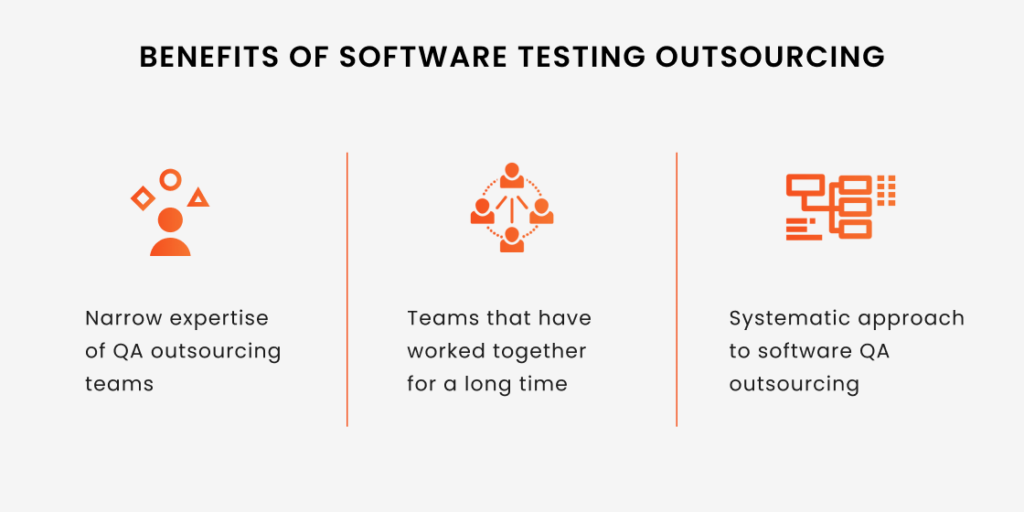
Benefits of Software Testing Outsourcing to Software QA Companies
Narrow expertise of QA outsourcing teams
Cross-functional and diverse knowledge is great for many things, from writing novels to small talking in public. However, when it comes to in-depth quality assurance practices, broad expertise won’t do the trick, and the project may require much more than the use of simple manual testing techniques. The truth is, excellence comes from practice. What software owners should really look for in their QA engineers is a definite focus on software testing throughout their career overlapped with a good grasp of specific testing and quality assurance techniques, methods, and types.
Companies focusing on QA as a service possess a deeper knowledge of product quality and ways to accomplish it, as well as a strategic vision of the IT industry trends. Choosing outsourced or offshore software testing labs over broad-spectrum IT companies that do a little bit of everything, you’re setting yourself up for more accurate results achieved with a lot of QA software and approaches. For example, when you want to outsource test automation, you can easily find numerous companies with a relevant skillset. Other advantages you’ll get include:
- Access to a ton of testing devices available for desktop and mobile app testing;
- Streamlined software testing operations, including post-delivery technical support;
- Availability of advanced, skill and resource-intensive testing types, including security testing and penetration testing;
- Extensive test documentation written according to the most sophisticated standards;
- Experience in documenting the QA process, which means you can not only get the neatest documents of your testing project, but also fill the gaps in documentation made by your development team in the past.
Narrow expertise in software quality assurance combined with the industry-specific experience of your testing team and knowledge of the main testing methodologies will make a huge positive impact on your end product.
Teams that have worked together for a long time
Before you dive into your QA journey, we want you to realize one thing: you don’t need the best people, you need the best team. Unfortunately, testing expertise does not always come with communication skills and strong work ethics. This proves that forming a team from scratch is a real challenge. Candidates that impressed you during the interviews might have difficulties impressing each other during the actual working process. The tension between the team members will sooner or later lead to a conflict ― productivity’s worst enemy. In this case, the organization’s top management has no other option than to replace some employees with new ones, which means starting the recruitment process all over again.

“Fitting in with other people and achieving a continuously high level of productivity takes a lot of time. But once finding teammates that can stay on the same page as you even from a distance, the phrase “team synergy” stops being just another buzzword. It is truly impressive how far a united team can take the project.”
Michael Tomara, QA Tech Lead at TestFort
What’s good about partnering with an already established QA team, is that you can actually browse through the achievements these people have gained together. Namely, the fresh addings to the software testing outsourcing company’s professional portfolio will show you all the necessary information. If in doubt, you can always ask specifically for the projects completed by the people you’re considering to sign up for your software. Also, we highly recommend meeting your team online at least once, just to make sure that their soft skills match your expectations.
Systematic approach to software QA outsourcing
The software testing process is quite straightforward, yet it is not simple. Many QA engineers focus on the code and bugs so hard, they forget to keep the testing results neat and reusable. In other words, quality assurance best practices and documentation often get neglected in the project course if the team doesn’t really stand for them.
Throughout the years of working with people who outsource QA testing, we learned how important it is to document the process carefully and store the documentation in order. This gives a wide perspective on the project’s history, functionality growth, and all the pain points and challenges encountered during the development. Some testing types (e.g., regression testing) can be really complex and time-consuming to perform if the project documentation is absent or the QA team decided to work on outdated testing software. Working with technical vendors that praise QA best practices, you’ll never be left with no documentation describing the work done to your application.

Do you know how software testing documentation should look like?
Download a free bug report sample to find out.
Keeping project documents in order requires a decent level of discipline amongst dedicated QA team members, so as the project planning process. Service providers that lack experience just yet tend to underestimate the importance of thoroughly planned processes. However, due to the complex nature of testing itself and programming in general, it’s very easy to get distracted by newly emerging issues during the project course. A firm project plan is what assures the team is going to reach the finish line and gets back on track people who encountered challenges that consumed more time than expected. Companies that have delivered dozens of projects aimed at the same thing ― top-notch quality ― understand the long-term significance of a testing plan for the end product.
Professional QA vendors use a systematic approach to software testing services distribution, which means you can expect nothing less than best industry practices, certified processes, and no inaccuracies when it comes to documentation and reporting for quality testing. For example, as our personal testament to the quality assurance industry best practices, we abide by CMMI process appraisal to evaluate our service delivery capabilities and improve our performance at all possible levels. Such specific things rarely can be found in IT generalists service vendors, so keep that in mind when looking for a QA service provider.
Keeping project documents in order requires a decent level of discipline amongst dedicated QA team members, so as the project planning process. Service providers that lack experience just yet tend to underestimate the importance of thoroughly planned processes. However, due to the complex nature of testing itself and programming in general, it’s very easy to get distracted by newly emerging issues during the project course. A firm project plan is what assures the team is going to reach the finish line and gets back on track people who encountered challenges that consumed more time than expected. Companies that have delivered dozens of projects aimed at the same thing ― top-notch quality ― understand the long-term significance of a testing plan for the end product.
Professional QA vendors use a systematic approach to software testing services distribution, which means you can expect nothing less than best industry practices, certified processes, and no inaccuracies when it comes to documentation and reporting for quality testing. For example, as our personal testament to the quality assurance industry best practices, we abide by CMMI process appraisal to evaluate our service delivery capabilities and improve our performance at all possible levels. Such specific things rarely can be found in IT generalists service vendors, so keep that in mind when looking for a QA service provider.
How to choose a testing outsourcing partner
No matter what your software testing demands are, you will likely find dozens, if not hundreds, of companies that will be happy to work on your project. However, you can only expect a reliable result if you take the time to choose the right partner. Here are the most important things to look for when making that choice:
- Testing specialty. There are many companies that provide all kinds of testing, and that can be a good option for the majority of projects. However, sometimes you need more narrow expertise — for example, cloud testing, medical device testing, or high-intensity performance testing. Always make sure the company you’re considering has relevant experience.
- Resource availability. If you only need one or two QAs to help with a testing project, then most companies can likely provide you with the resources you need. However, not all vendors have a large number of available testers who can immediately start a new project. Ask if your vendor has the required resources, and if not, then inquire how long it will take them to complete the hiring process.
- Choice of cooperation models. Modern outsourcing companies use different engagement models to work with their clients. The most popular models include time and material, staff augmentation, project-based cooperation, and on-site testing. This is something to discuss early in your project talks.
- Security and confidentiality. When you entrust your testing project to an outside team, the last thing you should expect is for the intellectual property related to the project to get into the wrong hands. Your vendor needs to ensure a secure testing infrastructure, as well as produce non-disclosure agreements for all stakeholders and confidentiality contracts for every member of the team.
- Effective communication. From the very beginning, long before the actual start of the project, you and your vendor need to be on the same page in terms of communication. In other words, the outsourcing partner needs to keep you properly informed on every aspect of the project and every update to give you a realistic idea of where things stand and what to expect.
Should you outsource software testing?
Business process outsourcing is a resource-optimizing strategy proven by years of use. Just like any other management technique, it has its own risks and it is only up to you whether they’re worth taking. However, the promising benefits an outsourcing service may bring to its adopters outweigh most of the pitfalls. When you hire offshore software testers that are a good fit for your team and both parties are carefully taking care of the working process, the outsourcing strategy will definitely make it to the permanent business management suite of your company.
Frequently Asked Questions
What is outsourcing software testing?
Software testing outsourcing is the practice of businesses hiring software testing outsourcing companies to help with some or all of the aspects of testing a software product. Companies can use outsourcing software testing services long-term for multiple projects, or go for outside QA testing services to help with just one project. Many companies choose to collaborate with experienced software testing engineers from a QA outsourcing vendor on a regular basis to produce better-quality software.
Why outsource software testing?
There are many reasons why companies are outsourcing QA services. The main advantages of outsourcing quality assurance include a smarter use of resources compared to hiring an entire in-house testing team and getting to work with software outsourcing vendors with rare expertise and set of skills while retaining full control over the testing process. Companies can also benefit from software QA and testing outsourcing by speeding up the software development process and beating the competition even in the most competitive software development market with the help of experienced QA professionals.
What are the two types of outsourcing?
There are different approaches to identifying types of independent software testing services. According to one of the most popular ones, the two types are staff augmentation and project-based cooperation. Under staff augmentation, the outsourcing testing firm provides one or more QA engineers with the necessary qualifications who work as part of the client’s team long-term and can participate in different software testing and QA projects on the client’s side. With project-based cooperation, testing is outsourced to an entire team on the vendor’s side, but the collaboration is usually limited to one project.
What is the difference between outsourced testing and crowdsourced testing?
With outsourced testing, you typically work with the same testers, and testing usually happens in one location. With crowdsourced testing, you entrust software quality assurance processes to a distributed team of QA engineers who may be located in different parts of the world. Crowdsourced testing is a global app testing technique that demands a strong management system to get consistent results and proves more helpful when you want to get different opinions from a varied audience to produce more high-quality software products with an engaging UX.
